Police: Illegal Alien Released by Feds Killed Alabama Mother of Two
A young illegal alien who was caught and released by federal immigration officials is now accused of killing a Mobile,Read More
A young illegal alien who was caught and released by federal immigration officials is now accused of killing a Mobile,Read More
Friday on MSNBC’s “Deadline,” former CIA Director John Brennan declared that “autocrats and authoritarians around the world” were taking advantage ofRead More
Pole Vaulter, 84, Sets Sights On More Records… (Third column, 14th story, link) Advertise here
After 675 days, Special Counsel Robert Mueller’s investigation is over. But President Donald Trump’s legal troubles are far from finished.
What has ended is the Department of Justice’s investigation into Russia’s role in the 2016 presidential election, which began after the United States assessed that Moscow had intervened in the vote to tip the election in Trump’s favor. Both Trump and Russia have consistently denied this. But Mueller’s investigation has led to 215 criminal charges, 38 indictments or pleas, and 5 prison sentences so far. His probe ensnared Trump’s business associates, many of whom had become involved in his political career, including his former personal lawyer Michael Cohen and former campaign chairman Paul Manafort. The special counsel’s office also unearthed a web of criminality, not always directly related to Russian interference.
[Read: Donald Trump’s Mafia mind-set]
Mueller’s probe pursued multiple lines of inquiry, spiraling out from Trump’s immediate circle into investigations implicating foreign nationals and Washington lobbyists. As a direct result of Mueller and his team’s work, at least eight people, including Manafort and Cohen, were convicted of crimes ranging from unregistered foreign lobbying to campaign-finance violations.
Mueller referred a number of cases to federal prosecutors in New York, Virginia, and Washington, D.C.—and their investigations are ongoing. At the same time, several congressional committees are also pursuing their own investigations.
Here’s a list of all the ongoing government investigations that could spell legal trouble for Trump, regardless of whether he’s president, and the people and entities associated with him.
Many of the investigations that Mueller’s team prosecuted or referred to other prosecutors ended up in federal attorneys’ offices in the Washington, D.C., area. Even though the special counsel’s probe is over, some of the investigations remain ongoing. Here’s what’s left, as far as we know:
At least three investigations in this district have not yet concluded. Prosecutors are reportedly looking into the financial dealings of Trump’s inauguration committee, which took in a record $107 million for the festivities surrounding his inauguration, in January 2017. In February, prosecutors subpoenaed a wide range of documents from the inauguration committee, and investigators seem particularly interested in whether it took money from donors connected to Middle Eastern governments.
Prosecutors in the Southern District of New York are also reportedly looking into whether Manafort, as chairman of Trump’s campaign, illegally coordinated with a pro-Trump super PAC, Rebuilding America Now, and whether that super PAC also received donations from people connected to Qatar and other Middle Eastern countries. These investigations have not yet led to any indictments or charges.
[Read: New York prosecutors may pose a bigger threat to Trump than Mueller]
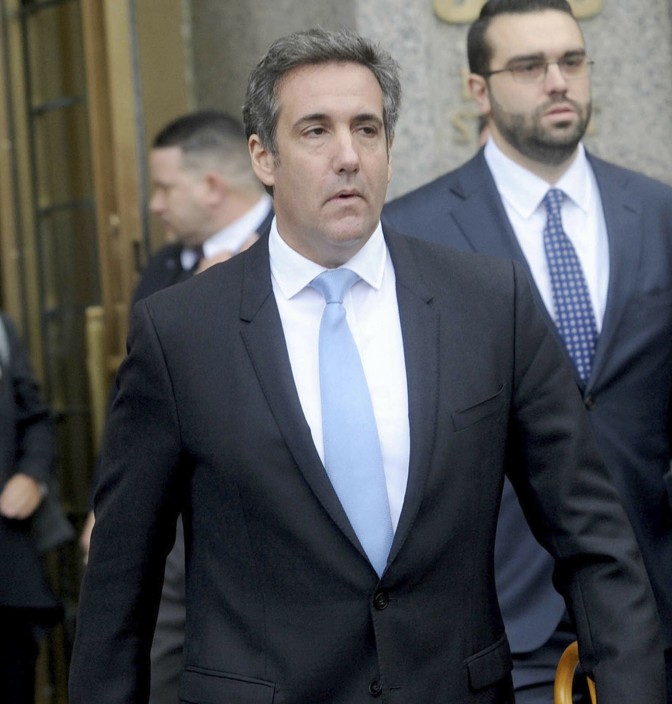
Two lobbying firms indicted for their failure to register as foreign lobbyists, Mercury Public Affairs and the Podesta Group, have also not reached a conclusion in their cases. A third firm, Skadden Arps, settled its case in January.
During testimony before the House Oversight Committee in February, Trump’s former personal lawyer Cohen revealed that prosecutors were also looking into his communications with Trump and Trump’s representatives following the FBI raid of Cohen’s office in April 2018. SDNY prosecutors have not publicly commented on this investigation, though recently released court documents show that Mueller had a warrant to look into Cohen’s emails as early as July 2017.
Three unresolved cases are in this district. Kamil Ekim Alptekin, an associate of former National Security Adviser Michael Flynn, was indicted and charged for acting as an agent of the Turkish government and lying to the FBI. He has not appeared in court and, as far as we know, hasn’t been arrested; his case is unlikely to be resolved quickly for that reason. Another Flynn associate, Bijan Kian, is still awaiting trial for failing to register as a foreign agent after working on behalf of the Turkish government. Kian has pleaded not guilty.
[Read: A surge in foreign-influence prosecutions]
Prosecutors have also indicted Elena Alekseevna Khusyaynova, the accountant for the Internet Research Agency, the Russian troll farm that authorities believe created fake social-media accounts to influence United States elections. She has been charged with crimes relating to interfering in both the 2016 presidential election and the 2018 midterm election. Though a warrant has been out for her arrest since last October, she isn’t in custody as far as we know either.
The ongoing cases in the D.C. District Court are almost all related to the WikiLeaks release of hacked emails from the Hillary Clinton campaign and the Democratic Party. A number of Trump associates charged as part of the Mueller probe are still awaiting sentencing in this district as well.
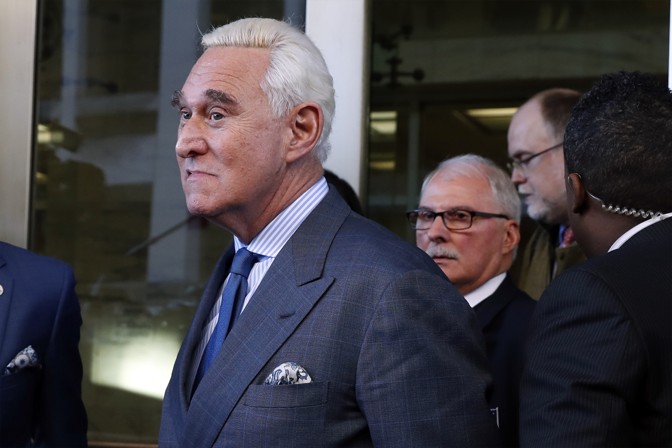
The longtime Trump associate Roger Stone was arrested in January 2019 and charged with making false statements, witness tampering, and obstructing an official proceeding. The FBI raided his home in Fort Lauderdale, Florida, when he was arrested. Stone has pleaded not guilty, and his trial is set for November 5. After a series of ill-advised social-media posts, one of which depicted Judge Amy Berman Jackson, who is presiding over his case, in crosshairs, Jackson placed Stone under a full gag order.
Flynn, the former national security adviser, pleaded guilty to making false statements to the FBI in December 2017. He has not been sentenced, because he has been cooperating with Mueller’s investigation, leading to speculation that he could receive a greatly reduced sentence due to the extent of his cooperation.
Rick Gates, a business associate of Manafort, was charged with conspiracy and failure to register as a foreign agent, among other charges. Gates pleaded guilty and cooperated at length with Mueller’s investigation, including testifying at Manafort’s trial in the Eastern District of Virginia.
Konstantin Kilimnik, another Manafort associate charged with obstruction of justice and conspiracy to obstruct justice, has also been indicted, but has not yet appeared before the court.
[Read: The origins of Paul Manafort, Trump’s campaign manager]
Prosecutors have also been busy charging Russians and Russian companies with attempting to interfere in the United States political system. Maria Butina, a Russian national attending graduate school in the United States, pleaded guilty to conspiring to act as an unregistered Russian agent. She worked to infiltrate a number of conservative organizations at the direction of a Russian government official. Butina pleaded guilty as part of a plea deal, but has yet to be sentenced.
In February 2018, three Russian businesses, including the Internet Research Agency, and 13 Russian nationals were charged with federal crimes committed while they allegedly attempted to interfere in the United States political system, particularly the 2016 presidential election. The Trump administration imposed financial sanctions on the individuals and businesses indicted.
In July 2018, a grand jury charged 12 Russian intelligence officers for their roles in “large-scale cyber operations” aimed at meddling in the 2016 presidential election. These officers are alleged to have been behind the email hacks, and they allegedly coordinated with WikiLeaks to release the hacked emails before the election. As far as we know, the Russian intelligence officers haven’t been arrested, and no further public information is available on this case.
In August 2018, The Washington Post reported that the Department of Justice was investigating Elliott Broidy, a prominent Republican fundraiser, for possibly attempting to cash in on his connections with the Trump administration by requesting millions of dollars from foreign governments in exchange for pushing the administration to take actions benefiting those countries. ProPublica reported in March that federal investigators had, at some point the previous year, raided Broidy’s Los Angeles office. Their search warrant authorized them to seize a wide range of evidence related to Broidy’s contacts with foreign governments, including the United Arab Emirates, Saudi Arabia, Malaysia, and China, as well as people including Rick Gates.
Broidy has been linked to George Nader, a witness in Mueller’s probe who also has close ties with the UAE.
In addition to the investigations in New York, Virginia, and Washington, D.C., that are directly related to Mueller’s probe, other jurisdictions are conducting numerous investigations into various people and organizations with connections to Trump.
The attorneys general of Washington, D.C., and New Jersey, like investigators in the Southern District of New York, have each subpoenaed the records of Trump’s inauguration committee, indicating a widening prosecutorial interest into that committee’s practices.
At least four ongoing investigations are happening at the state and local level in New York. The tax departments for both New York State and New York City have opened investigations into Trump’s taxes after a New York Times investigation found that Trump benefited from a $400 million tax scheme.
In March, the New York attorney general opened an investigation into Trump Organization projects, including four major Trump Hotel and Tower projects and the organization’s failed attempt to purchase the Buffalo Bills football team. The office subpoenaed Deutsche Bank and Investors Bank for its financial records related to the Trump Organization. Even when other banks refused to lend to Trump, Deutsche Bank became his go-to lender, and the New York attorney general hopes that it kept records of his financial practices that could be of use to the state in its investigations.
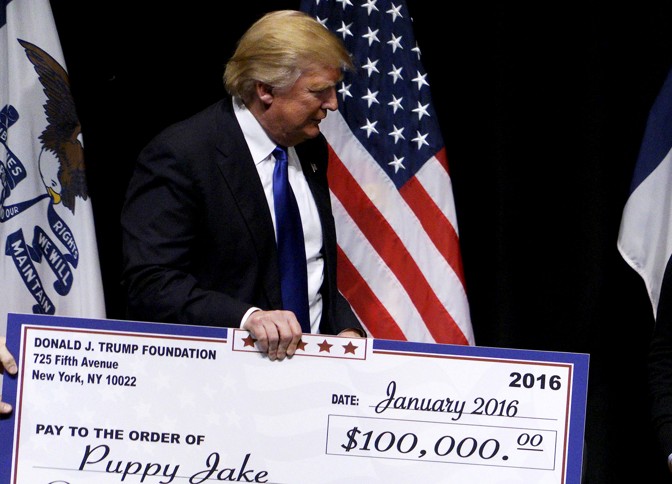
The New York attorney general is reportedly still conducting a criminal investigation into the activities of the Trump Foundation, even though the foundation is dissolving. After a two-year investigation, the New York attorney general’s office filed a lawsuit alleging that the Trump Foundation violated campaign-finance law and coordinated with Trump’s presidential campaign.
Other states have moved to file lawsuits against Trump and his businesses after investigations: the attorneys general for Maryland and the District of Columbia sued Trump in 2017 for allegedly violating the emoluments clause of the Constitution.
Trouble could also still be brewing in state courts for some Trump associates who have already been convicted as part of the Mueller probe. The Manhattan district attorney indicted Manafort, Trump’s former campaign chairman, on 16 charges, including mortgage fraud. A key difference between these charges and the ones Manafort was convicted of in federal court is that Trump would not be able to pardon Manafort for these crimes should he be convicted.
While Mueller’s investigation may be over, congressional Democrats have made it clear that they intend to conduct a thorough investigation of their own. On March 14, the House of Representatives voted unanimously on a resolution demanding that Attorney General William Barr release the Mueller investigation’s full findings. The resolution was sent to the Senate, where the Republican Lindsey Graham said he would only vote for it if it created a second special counsel that would investigate Hillary Clinton’s emails, effectively blocking the resolution’s passage.
[Read: The Democrat who could lead Trump’s impeachment isn’t sure if it’s warranted]
Congress is launching the next wave of investigations into the Trump presidency. Here’s a rundown of all the committees in play:
In spring of 2018, the Republican-controlled House Intelligence Committee’s probe concluded that, while Russia attempted to interfere in the 2016 presidential election, it did not do so to aid President Trump, contrary to the universal findings of the U.S. intelligence community. It also concluded that there was no collusion between Russia and the Trump campaign. The investigation was led by Republican Representative Devin Nunes, a member of the Trump transition team who has long denied contact between the Trump campaign and Russian operatives. Nunes’s involvement contributed to the probe’s heightened politicization, especially after reporting revealed that Nunes had been sharing material with the White House behind the committee’s back.
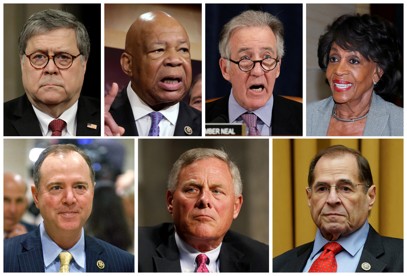
Now controlled by Democrats and chaired by Representative Adam Schiff, the Intelligence Committee has reopened its investigation into Russian interference and expanded the scope of the probe, hiring numerous investigators such as Daniel Goldman, a former federal prosecutor who specializes in Russian organized crime. The committee is pursuing five lines of inquiry: the scope and scale of Russian interference in the U.S. political process; the extent to which the Russian government connected with the Trump campaign; whether any foreign actor has leverage over Trump; whether members of Trumpworld have been at risk of having a foreign actor hold leverage over them; and whether any actor, including the president, attempted to obstruct justice.
A key point of investigation is the June 2016 meeting in Trump Tower between Manafort, Donald Trump Jr., Jared Kushner, and Russian officials, which was allegedly convened with the understanding that Trump associates could receive damning details about Clinton from the Russians. If this is true, it would constitute illegal campaign contribution to a political campaign. In early March, Cohen testified before the committee in a closed hearing, and Schiff pledged to release the transcript. However, on March 12, he said the committee was holding the transcripts for now because investigators needed to follow up on multiple leads. Politico reported that Cohen also gave the committee numerous documents to support his claim that Jay Sekulow, one of the president’s attorneys, edited Cohen’s false testimony before Congress about the Trump Tower Moscow deal. Sekulow said it was “completely false” that Trump’s attorneys had “edited or changed his statement to Congress to alter the duration of the Trump Tower Moscow negotiations.”
Schiff also told reporters that he was interested in investigating Cohen’s claim that the president knew about Stone’s communications with WikiLeaks. Felix Sater, a Trump-allied real-estate developer who worked on the Trump Tower Moscow deal, will testify before the committee on March 27.
The Intelligence Committee is also planning a joint investigation with the House Financial Services Committee that will look into Deutsche Bank’s lending practices. Chaired by the Democrat Maxine Waters, the Financial Services Committee plans to look into why Deutsche Bank was willing to lend money to the Trump Organization when other financial entities would not. According to Waters, Trump’s family, including Ivanka Trump and Kushner, bank with Deutsche bank.
Deutsche Bank has been fined in the past for money laundering for Russian clients, and is under scrutiny for its involvement with Danske Bank of Denmark, which is also under scrutiny for money laundering. The committee is looking to see whether illicit money, from Russia or otherwise, ended up in any of the Trump Organization’s accounts, and whether there is any evidence of money laundering, Russian or otherwise. Deutsche Bank has said it plans to assist the lawmakers “in their official oversight functions.”
Led by Chairman Elijah Cummings, the Oversight Committee is pursuing multiple investigations into Trump and his administration. When the Republicans controlled the committee, they blocked at least 64 subpoena requests filed by Democrats. Now that Democrats are in power, they can reissue those subpoenas.
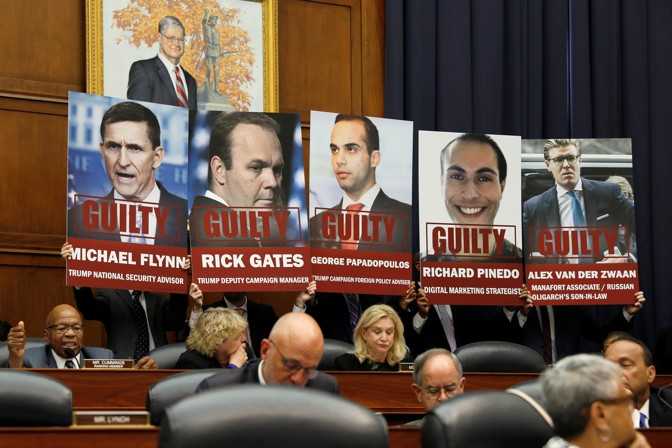
The committee heard testimony from Cohen on March 7, 2019. Cohen suggested that President Trump knew about Roger Stone’s connections to WikiLeaks, and testified that Trump’s lawyers edited his initial testimony to Congress about Trump Tower Moscow. He also suggested that Trump has inflated his assets, and was also aware of Cohen’s hush money payments to adult-film star Stormy Daniels. According to CNN, the committee has also requested interviews with two attorneys—former White House Deputy Counsel Stefan Passantino and Trump’s personal attorney Sheri Dillon—after evidence emerged suggesting they might have lied to federal ethics officials about payments made to Daniels.
The committee is also investigating the process for obtaining security clearance in the White House, following a report from The New York Times that Trump intervened to give his son-in-law, Kushner, security clearance. The committee has asked the White House for documents and launched a broader investigation into the clearance process overall.
Additionally, the committee is investigating Trump’s activities in regards to the Trump Hotel in Washington, D.C., and whether Trump’s business interests as a landlord have been aided by his position as president.
In February 2019, the committee, chaired by Democratic Representative Jerry Nadler, hired Special Oversight Counsels Barry Berke and Norm Eisen to help consult on oversight of the Department of Justice, including matters of the Mueller investigation. In early March, the committee launched a wide-scale investigation into three questions: whether Trump’s alleged interference with criminal investigations amounts to obstruction of justice; whether Trump or his associates broke campaign-finance laws; and whether Trump has committed abuses of power through his frequent attacks on the press, the courts, and certain law-enforcement agencies. It requested documents from more than 80 people and organizations in the Trump orbit or connected to alleged foreign interference in U.S. elections, including Donald Trump Jr., and threatened to issue subpoenas for the documents if they were not provided to the committee.
In 2019, the committee has heard both public and private testimony from former Acting Attorney General Matt Whitaker, which covered conversations Whitaker had with the White House regarding the Mueller probe.
If Congress were to move to impeach the president, it would begin in this committee.
Ways and Means is one of Congress’s most powerful committees, and Democratic Chairman Richard Neal has said he plans to build a case for subpoenaing a copy of Trump’s personal and professional tax returns. The president has been under pressure to release his returns since the 2016 campaign, but has consistently refused, leading some to believe that they contain evidence of financial malfeasance. On February 7, the committee held a hearing on “legislative proposals and tax law related to presidential and vice-presidential tax returns,” which looked into ways the committee could legally obtain the returns.
Democratic Chairman Eliot Engel has said he plans to investigate whether Trump’s business ties abroad are affecting his foreign-policy decisions. Specifically, Engel said he wanted to look into whether Trump violated the Constitution’s emoluments clause. On February 27, 2019, the committee held a full hearing on the Trump administration’s foreign policy.
On March 4, Engel, in conjunction with the Intelligence Committee and the Oversight Committee, also issued a letter demanding documents and interviews about Trump’s communications with Putin.
The Senate Intelligence Committee has been investigating Russian interference since 2017, and the committee’s Republican chairman, Richard Burr, said the investigation will continue into 2019. It has interviewed more than 200 witnesses and obtained hundreds of thousands of pages of documents. The investigation has examined links between the Russian government and the Trump campaign, as well as the larger interference in the 2016 election by Russian operatives. The committee has seen some of the congressional highlights of the Russia probe; former FBI Director James Comey testified to the president’s possible obstruction of justice, and Attorney General Jeff Sessions testified about his deals with then–Russian Ambassador Sergey Kislyak, which led him to recuse himself from the Russia investigation. Kushner, Manafort, and Donald Trump Jr. have all testified for the Senate Intelligence Committee in closed-door hearings, as did Cohen, who was later revealed to have lied. On July 3, 2018, the committee issued a report concluding that Russia interfered in the 2016 election with the intention to help Trump. It has also issued a report detailing Russia’s extensive disinformation campaign.
[Read: The Senate’s Russia probe is facing a reckoning]
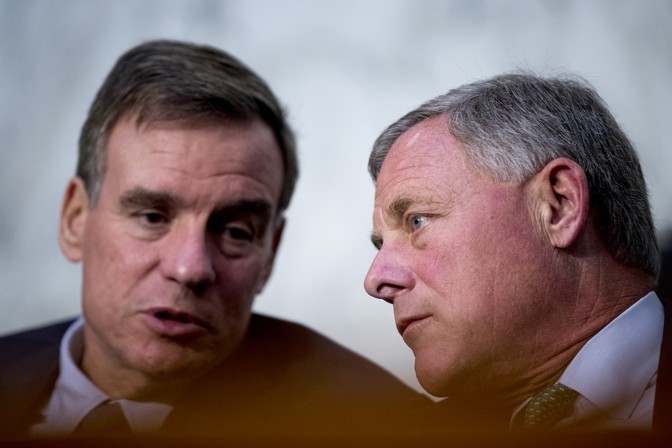
On February 7, Burr told CBS that the committee has yet to find evidence of collusion between the Trump campaign and Russia. Democratic Vice Chairman Mark Warner disagreed with Burr’s comments. Critics have pointed out that Burr has not held public hearings with key campaign officials and did not expand the committee’s investigative staff when the investigation began. While the bipartisan committee has been largely scandal-free, our colleague Natasha Bertrand reported in February that the committee has “recently begun to disagree more publicly on what the facts they’ve collected add up to: Conspiracy? A series of coincidences and bad decisions? Or something in between?” On March 2, 2019, Bertrand also reported that the committee is now looking into at least three trips Trump took to Russia and the U.S.S.R. over the past 30 years.
It’s Friday, March 22.
It’s Here: After one year, 10 months, and six days, Special Counsel Robert Mueller has submitted his final report to the attorney general, signaling the end of his investigation into a potential conspiracy between President Donald Trump’s campaign and Russia.
“Now it’s up to Attorney General William Barr to write his own summary of the findings, which will then go to Congress,” Natasha Bertrand reports. These are the threads that Mueller has already unspooled (and the lingering questions might now fall to Congress).
The Man, the Myth: Rod Rosenstein appointed Special Counsel Robert Mueller in May 2017 to investigate ties between the Trump campaign and the Russian government. In the years since, Mueller turned into something of a mythical figure to many Americans on the left—someone onto whom they’ve projected their greatest hopes about Trump’s wrongdoings, Megan Garber writes.

(Colin Anderson / Alex Wong / Getty / Paul Spella / The Atlantic)
Decentralized: Medical facilities across the U.S. all have their own method for collecting patient information, which can lead to confused doctors and bad care for patients. And fixing the problem has so far proved impossible.
They’re All Running: The Democrat Michael Bennet, a senator from Colorado, is reportedly close to announcing his own bid for the presidency. (Here’s our 2020 candidate tracker.)
Victorious?: President Donald Trump announced that he’s reversing U.S. sanctions imposed on North Korea just yesterday. White House Press Secretary Sarah Huckabee Sanders said Trump “likes Chairman Kim” and thinks the sanctions are unnecessary.Sanders also told reporters on Air Force One that ISIS territory has been “100 percent eliminated” in Syria. (President Trump has declared victory over the terrorist group before but, then as now, the question remains: Does less physical land actually signify defeat?)
Time’s Up: Two months ago, the U.S. announced that it would recognize Juan Guaidó as the legitimate president of Venezuela as part of an effort to pressure the country’s current president, Nicolás Maduro, to step down. But with Maduro still clinging to power, the international community’s options are dwindling.
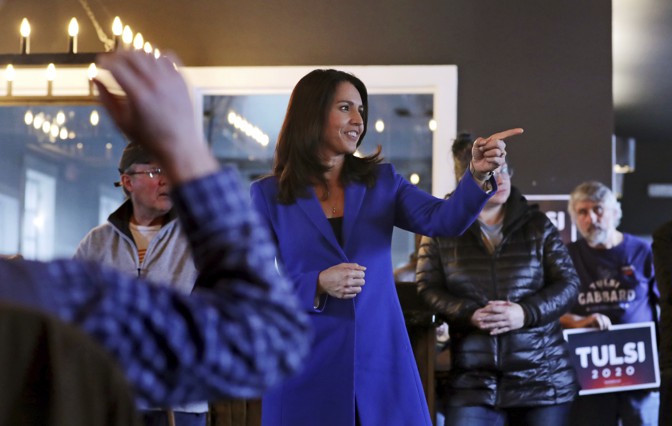
Presidential hopeful Tulsi Gabbard, a Congressional Democrat from Hawaii, takes a question during a campaign stop at a brewery in Peterborough, New Hampshire. (Charles Krupa / AP)
Nobody Knows Anything About ‘Electability’ (Peter Beinart)
“The irony is that many political commentators think it’s easier to have an informed opinion about electability than about policy. It’s actually harder.” → Read on.
John Oliver’s Weak Case for Callout Culture (Conor Friedersdorf)
“One could argue that Oliver was holding Leno “accountable” for jokes he told in the 1990s that now seem cruel and unfunny. But Oliver could’ve criticized the old jokes while still treating Leno as he treats himself: as an imperfect but not malign comic who told jokes that are regrettable in hindsight.” → Read on.
Kavanaugh Went Up to the Line That Sotomayor Crossed (Josh Blackman)
“The Court should resist the urge to wade, or even dip a toe, into partisan squabbles by naming the politicians responsible for legislation, unless, of course, those facts are necessary to resolve a given case.” → Read on.
‣ Parkland Shooting Survivor Sydney Aiello Takes Her Own Life (Christina Capatides, CBS News)
‣ House Democrats Move to Hobble Primary Challengers (Ally Mutnick, National Journal)
‣ Trump Is a Massive Failure—And Getting Exactly What He Wants (Andrew Sullivan, New York) (? Paywall)
‣ How Twitter’s Algorithm Is Amplifying Extreme Political Rhetoric (Oliver Darcy, CNN)
We’re always looking for ways to improve The Politics & Policy Daily. Comments, questions, typos, grievances and groans related to our puns? Let us know anytime here.
Were you forwarded this newsletter? Sign up for our daily politics email here. We have many other free email newsletters on a variety of other topics. Find the full list here.
The blog is beginning the hiring process for a new blog manager. The blog manager’s job includes, but is not limited to:
The qualifications for the position include:
A commitment of at least two years is required. The position will begin in mid- to late summer. To apply, please send a cover letter, resume, transcript (either official or unofficial), and unedited writing sample (no more than five pages) to jlevitan@scotusblog.com and ahamm@scotusblog.com by April 22. Salary is competitive and commensurate with experience. This position is located in Bethesda, Maryland.
The post SCOTUSblog is hiring appeared first on SCOTUSblog.
With a few strokes on his keyboard on Thursday, President Trump undermined one of the fundamental norms of international law. “After 52 years,” he tweeted, “it is time for the United States to fully recognize Israel’s Sovereignty over the Golan Heights, which is of critical strategic and security importance to the State of Israel and Regional Stability!” The timing of the tweet, 19 days ahead of Israel’s elections, suggests that Trump is determined to assist Prime Minister Benjamin Netanyahu’s reelection efforts, despite the prospect of increasing tensions with Arab leaders, Europe, and Russia, all of whom vehemently oppose recognizing Israel’s Golan Heights claim. It will also embolden the Israeli far-right, which has been pushing for annexation of the West Bank.
Israel captured the Golan Heights from Syria in the 1967 Six Day War. In 1981, the Israeli parliament, the Knesset, passed a law annexing the Golan, despite the clear prohibition in international law on forcible acquisition of land. In response, the UN Security Council passed resolution 497 determining that the Israeli law is “null and void.” No country to date has recognized the annexation of the Golan and Israel itself conducted negotiations with the Syrian regime for the return of the entire territory in exchange for peace.
Following the outbreak of the Syrian uprising in 2011 that devolved into a ferocious civil war, Israeli officials recognized the opportunity to win international legitimacy for the annexation of the Golan. As the Assad regime resorted to utilizing chemical weapons, barrel bombs and starvation sieges to crush the armed rebellion and protest movement, killing thousands of Syrians in the process, no international actor attempted to pressure Israel into negotiating with Assad. Israeli officials pushed the Obama administration to recognize Israel’s annexation of the Golan, but came up short.
Trump’s presidency put multiple goals of Israel’s right-wing government and even the Israeli far-right within grasp. In the first two years in office, the Trump administration withdrew from the Iran nuclear deal; cut U.S. funding to UNRWA, the UN agency in charge of providing relief to Palestinian refugees; softened its criticism of Israeli human rights abuses in the occupied Palestinian territories and at times even defended such abuses; and, most importantly, moved the U.S. embassy from Tel Aviv to Jerusalem, implicitly recognizing Israel’s annexation of east Jerusalem, which under previous deals negotiated between Israel and the Palestinians, is supposed to be the capital of a Palestinian state. Israeli officials began lobbying the Trump administration to recognize Israel’s annexation of the Golan, but were previously unsuccessful, in part due to Russian pushback against recognition. (Russia has been providing military and diplomatic cover in support of the Assad regime)
The timing of the tweet, which apparently surprised Trump administration officials, can most easily be explained by Israel’s elections, set to be held on April 9. Polls currently show that Netanyahu, a close Trump ally and fellow nationalist, will likely be Israel’s next prime minister. In several months, however, Netanyahu is set to be indicted on three corruption charges, and he is desperately trying to guarantee strong results for his own and other right-wing parties, in order to form a coalition that will back him even after those indictments land. The timing of the announcement also helps deflect Israeli public attention away from a new corruption scandal exposed this week involving Netanyahu purchasing stocks at an incredible discount, possibly hiding a bribe.
Netanyahu, as Israel’s prime minister and minister of foreign affairs, will get sole credit for the diplomatic achievement expected to be followed by an official American recognition next week, during Netanyahu’s visit to Washington, DC. Maintaining Israeli control over the Golan is widely supported among Israeli Jewish voters, and Trump’s decision now places Netanyahu’s election competitors in an awkward position of issuing congratulatory messages, further cementing Netanyahu’s reputation in Israel as a masterful diplomat.
Trump’s decision is likewise a boon for the Israeli right, which for years has insisted on ignoring international norms and opprobrium, arguing that the international community and Arab countries will eventually bend to Israel’s will if Israel demonstrates its power and resolve. Trump’s recent moves, plus the growing public ties between Israel and Gulf Sunni countries, are helping the Israeli right convince voters that their approach was the correct one all along. The Israeli Left, which for years used the threat of international isolation to push Israelis to support negotiations for a two-state-solution, now struggles to offer a coherent narrative as to why negotiations are necessary or beneficial. The Trump administration demonstrates, again and again, that Jerusalem can remain obdurate on the Palestinian issue and still reap diplomatic victories.
More troublingly, these consecutive de-facto recognitions of Israeli annexations may also embolden voices in the Israeli right calling for the annexation of the West Bank, which is under Israeli military rule, but has not been incorporated into Israel by law. Those calling for this annexation, including some members of Netanyahu’s Likud and parties further to the right, propose annexing the territory without granting its Palestinian inhabitants Israeli citizenship. Such a move would institutionalize the West Bank’s dual legal systems, with Palestinians remaining in permanent status of stateless people, while Israelis enjoy full citizenship rights.
For years, Netanyahu resisted such calls and even official decisions of his party’s central committee, electing instead to pursue a less-noticeable policy of creeping annexation. This policy involved displacing Palestinians from area C—a zone under full Israeli control comprising 60 percent of the West Bank—passing several laws legalizing previously illegal settlements, and turning a blind eye to the construction of new outposts (illegal under Israeli law) and expanding Israeli settlements.
The fear of international pushback and widespread West Bank violence kept Netanyahu from going further. In his next term in office, Netanyahu’s likely coalition partners and members of his own party will exercise no such restraint. This time, they could point to Trump’s support as proof that West Bank annexation, too, will also eventually receive international acceptance. Israel’s far right is keen to exploit whatever time President Trump and his hawkish team have left in office. This week, Trump gave them a big morale boost.
On Thursday’s broadcast of CNN’s “Situation Room,” Representative Anthony Brown (D-MD) criticized President Trump’s announcement that the U.S. will recognizeRead More
Ukraine has opened a probe into alleged attempts by domestic government officials to interfere in the 2016 presidential elections inRead More
An illegal alien charged with murdering four Americans over the course of a week in Nevada did so in orderRead More
Executives from the country’s largest tech conglomerates, the big business lobby, and multinational corporations are demanding Congress pass the latestRead More
Fox News reported on Thursday that the final Islamic State stronghold in Syria, the village of Baghouz, has been liberatedRead More
Montreal priest stabbed during mass… (Third column, 13th story, link) Advertise here
Neighbors fuming… (Third column, 16th story, link) Related stories:Proposed Megamansion Bigger Than White House… Advertise here
On Wednesday, the Supreme Court unanimously affirmed the U.S. Court of Appeals for the 10th Circuit in Obduskey v. McCarthy & Holthus LLP, holding that parties who enforce security interests are not debt collectors within the meaning of the Fair Debt Collection Practices Act provided that they do no more than the bare minimum required by state law to enforce the security interest. Justice Stephen Breyer’s opinion for the court is short and primarily focused on the text of the statute. After the argument, in which the justices sounded skeptical about the petitioner’s reading of the text, this outcome is hardly surprising. Indeed, the most notable thing about this case is probably Justice Sonia Sotomayor’s concurrence.
For a consumer case, the relevant facts here are simple. After Dennis Obduskey defaulted on his mortgage, McCarthy & Holthus, on behalf of its client Wells Fargo, sent him a notice in 2014 initiating a nonjudicial foreclosure. This notice, which is mandatory under Colorado nonjudicial foreclosure law, listed various details about the underlying mortgage. Obduskey, understanding the notice to be an effort to collect a debt—namely his delinquent mortgage—responded by following the FDCPA’s procedures for disputing a debt. Rather than continuing through the FDCPA process, McCarthy & Holthus initiated a new nonjudicial foreclosure in 2015. Obduskey then brought this FDCPA claim.
The court’s opinion begins with an almost mechanical analysis of the statute. Section 1692a(6) of the FDCPA gives a “primary definition” of “debt collector” as:
any person … in any business the principal purpose of which is the collection of any debts, or who regularly collects or attempts to collect, directly or indirectly, debts owed or asserted to be owed or due another.
Parties meeting this definition are subject to a myriad of limitations aimed at protecting consumers. The statute also provides what the court calls “the limited-purpose definition”:
For the purpose of section 1692f(6) [the] term [debt collector] also includes any person … in any business the principal purpose of which is the enforcement of security interests.
Special rules apply to parties meeting the limited-purpose definition. Because there was no question that McCarthy & Holthus met the limited-purpose definition, the issue in this case was whether a party meeting the limited-purpose definition necessarily also meets the primary definition.
Breyer’s statutory argument proceeds in three parts. First, the only way to avoid surplusage is to read the limited-purpose definition as narrowing the primary definition. Second Congress may have used the limited-purpose definition to narrow the primary definition in order to avoid conflicts with state nonjudicial foreclosure regimes. And finally, the legislative history suggests that the FDCPA represents a compromise between those who would fully include enforcement of security interests under FDCPA protections and those who would exclude it.
Next, the opinion systemically rebuts the petitioner’s arguments. Here the court explains just how narrow the decision is. Obduskey had tried to argue that even if the primary definition of debt collector does not include “simply enforcing a security interest,” what happened here “was more than security-interest enforcement.” Colorado’s nonjudicial foreclosure regime required McCarthy & Holthus to send various notices before it could execute the foreclosure. These mandatory notices theoretically protect consumers by providing them with information about the status of their mortgage. Obduskey argued that whatever their purpose, most homeowners would understand such notices as an attempt to collect a debt. The justices acknowledge that consumers would interpret the threat of foreclosure as an attempt to collect debt, but this does not change their reading of the statute. The opinion explains that “because he who wills the ends must will the necessary means, we think the Act’s (partial) exclusion of ‘the enforcement of security interests’ must also exclude the legal means required to do so.” Because McCarthy & Holthus took only the steps that Colorado required, the court will not read the notices that it sent to Obduskey as an attempt to collect a debt that sits outside the limited-purpose definition.
This brings us to Sotomayor’s concurrence. Although she commends the court’s opinion for “mak[ing] a coherent whole of a thorny section of statutory text,” she writes separately to emphasize that “this is too close a case for me to feel certain that Congress recognized that this complex statute would be interpreted the way that the Court does today.” She invites Congress to clarify the statute “if we have gotten it wrong.”
Justice Sotomayor also uses her concurrence to emphasize the narrowness of the court’s opinion. Specifically, she writes that she “would see as a different case one in which the defendant went around frightening homeowners with the threat of foreclosure without showing any meaningful intention of ever actually following through.”
Given its narrowness, this case will probably do little to stem litigation over whether efforts to execute nonjudicial foreclosures are efforts to collect debts within the scope of the FDCPA. Had McCarthy & Holthus been even a little more aggressive in its collection efforts, this case might well have come out the other way.
The post Opinion analysis: An extremely narrow Fair Debt Collection Practices Act ruling appeared first on SCOTUSblog.